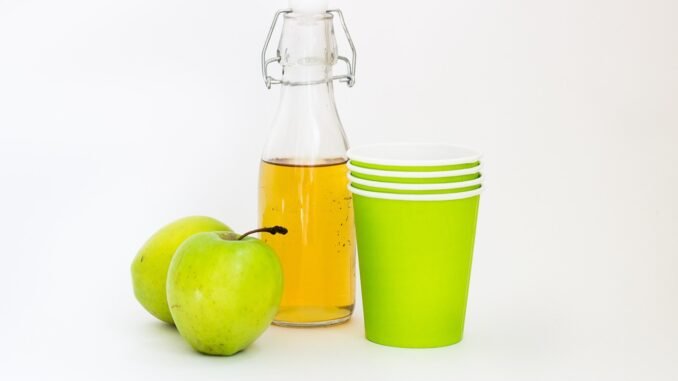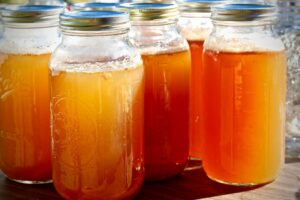
Apple juice and Epsom salt are two natural remedies that have been used for centuries to treat a variety of ailments. But how effective are they in treating gallstones? Gallstones are hard, pebble-like deposits that form in the gallbladder and can cause severe abdominal pain. Unfortunately, surgical removal is often the only option for treating them. However, many people believe that drinking apple juice and taking Epsom salt baths can help dissolve gallstones and reduce symptoms. In this article, we’ll explore the evidence behind these claims and discuss whether or not apple juice and Epsom salt are effective treatments for gallstones.
What are Gallstones?
Gallstones are small, hard deposits that form in the gallbladder. The gallbladder is a small sac located under the liver on the right side of the abdomen. The liver produces bile, which helps with digestion. The bile flows from the liver through tubes called ducts and into the gallbladder, where it is stored. When you eat, the gallbladder contracts and releases bile through another duct, called the common bile duct, into the intestine to help with digestion.
Gallstones can form when there is an imbalance in the components of bile. If there is too much cholesterol in bile, for example, crystals can form. If these crystals grow larger, they can become stones. Gallstones can also develop if the gallbladder doesn’t empty properly or if it empties too often. This can happen if you lose weight quickly or if you have certain medical conditions such as diabetes or Crohn’s disease.

Symptoms of gallstones include pain in the upper right side of the abdomen, pain in the back between the shoulder blades, pain under the right shoulder, and nausea or vomiting. If a stone lodges in one of the ducts that carry bile or pancreatic juice (which helps with digestion), it can cause a blockage and severe pain. This is called a pancreatic attack or a gallstone attack.
If you think you might have gallstones, talk to your doctor about treatment options.
Causes of Gallstones
There are many causes of gallstones, but the most common is a sedentary lifestyle. Other causes include genetics, being overweight or obese, having diabetes, and eating a high-fat diet. Gallstones can also form if you lose weight too quickly or if you take certain medications, such as birth control pills.
Apple Juice And Epsom Salt for Gallstones – Does it work?
Apple juice and Epsom salt have long been used as a home remedy for gallstones. The theory is that the citric acid in the apple juice helps to dissolve the stones, while the Epsom salt acts as a laxative to help flush them out of the body.
So, does it work? There is no scientific evidence to support this claim, and in fact, it is not recommended by medical professionals. There are potential risks associated with taking Epsom salts, such as dehydration, electrolyte imbalance, and gastrointestinal upset. Additionally, apple juice contains sugar and can actually make gallstone pain worse.
If you are considering trying this home remedy, it is important to speak with your doctor first. There are many other options available for treating gallstones that are much safer and more effective.
How to make the Apple Juice and Epsom Salt mixture?
To make the Apple juice and Epsom salt mixture, you will need:
- 1 cup of unsweetened apple juice
- 1 tablespoon of Epsom salt
- 1 cup of water
Instructions:
- Mix the apple juice and Epsom salt together in a glass or jar.
- Add the water and stir well.
- Drink this mixture right away, followed by another glass of water.
How long to drink the mixture?
It is typically recommended that people drink the Apple juice and Epsom salt mixture for at least 30 minutes. However, some people may need to drink the mixture for longer in order to help dissolve their gallstones.
How does it work?
Apple juice and Epsom salt are popular home remedies for gallstones. The jury is still out on whether or not this remedy actually works, but there are some theories as to how it might.
Some experts believe that apple juice and Epsom salt can help to break down gallstones. The theory is that the acid in the apple juice helps to dissolve the stones, while the Epsom salt acts as a laxative and helps to flush them out of the body.
There is no scientific evidence to support this claim, but some people swear by it. If you’re considering trying this home remedy, be sure to speak with your doctor first.

Pros and Cons
Apple cider vinegar is a popular home remedy for gallstones. Some people believe that drinking apple cider vinegar can help to break down gallstones and prevent them from forming in the first place.
However, there is no scientific evidence to support these claims. In fact, apple cider vinegar may actually increase your risk of developing gallstones.
Apple juice and Epsom salt are two other home remedies that are sometimes used for gallstones. Like apple cider vinegar, there is no evidence to support its use. In fact, they may also be harmful.
Apple juice is high in sugar and can cause weight gain. It can also trigger insulin resistance, which is a major risk factor for gallstone formation.
Epsom salt is a type of magnesium sulfate that is often used as a laxative. While it may provide some relief from constipation, it can also cause diarrhea and dehydration. These side effects can make your condition worse and increase your risk of developing gallstones.

Are there any side effects?
When it comes to alternative treatments for gallstones, Apple juice, and Epsom salt is a popular home remedies. But does it work?
There is no scientific evidence to support the claim that Apple juice and Epsom salt can dissolve or break down gallstones. However, there are a few case reports of people who say they have had success with this treatment.
It’s important to remember that even if this home remedy does work for some people, it’s not a cure for gallstones. If you have gallstones, you should still see a doctor to discuss your treatment options.
As with any home remedy, there are also some risks associated with using Apple juice and Epsom salt to treat gallstones. This treatment can cause diarrhea and vomiting. It can also lead to dehydration, so make sure you drink plenty of fluids if you decide to try this remedy.
Other Treatments for Gallstones
In addition to Apple juice and Epsom salt, there are a number of other treatments that can be effective in treating or preventing gallstones.
Dietary changes are often recommended as a first line of defense against gallstones. Eating plenty of fiber-rich foods, such as fruits, vegetables, and whole grains, can help reduce the risk of developing gallstones. limiting the intake of fatty foods, such as red meat and full-fat dairy products, can also help.

If dietary changes alone aren’t enough to prevent or treat gallstones, medication may be necessary. Cholesterol-lowering drugs, such as statins, may be prescribed in order to reduce the amount of cholesterol in the bile. Bile acid sequestrants can also be used to bind bile acids and prevent them from forming stones.
In some cases, surgery may be necessary to remove the gallbladder or stones. Laparoscopic cholecystectomy is a minimally invasive surgical procedure that involves the removal of the gallbladder through small incisions in the abdomen. This is typically done as an outpatient procedure and has a relatively short recovery time.
Conclusion
Apple juice and Epsom salt for gallstones is a controversial home remedy that doesn’t have any scientific evidence to back it up. While some people swear by the method, it’s important to remember that this isn’t a reliable way of treating your condition and should not be used as a primary form of treatment. Talk to your doctor about safe and effective treatments for gallstones before trying any alternative remedies.



Leave a Reply